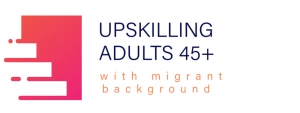ABOUT THE PROJECT
What is UPSKILLING 45+?
What is UPSKILLING 45+?

Upskilling Adults 45+, with Migrant Backgroud (UPAM 45+) project aims to provide solutions for better integration on the labour market and in the society of adults 45+, with the migrant background, through basic skills learning. It focuses on tackling the difficulties of (re)insertion on the labour market and in the community of migrants both from the EU and outside EU and of return migrants (individuals that take part in the emigration process, returning to their home country after a long stay abroad). The project develops integrated solutions necessary for adult education providers in order to support (re)migrants, adults aged 45+, to acquire basic skills: entrepreneurship, digital and soft skills, and/or, to validate their competences. This way, adults 45+ are supported, in a holistic way, for social and professional inclusion.
To contribute to the General Objective, the activities of the project are aimed at achieving the following expected results:
1. Designing dedicated programs for training 18 staff working with adults 45+
2. Provide tailored, holistic services for adults 45+, with the migrant background, so that they can access to the labor market and actively participate in the community.
3. A mix of validation services and training offers (for upskilling/ qualifying), together with guidance for entrepreneurial initiatives and job finding are to be designed.
4. Develop a learning strategy with 2 components: digital skills and soft skills that can be adapted to different contexts and target groups.
The scale of transnational migration is unprecedented. Europe had to face refugee or migrant “crisis”, with waves of refugees moving from the South to the West, trying to escape war and poverty. Alongside the “crisis”, wealthy countries are using migration as a strategy to fill gaps in their labour market and to replenish an aging workforce, draining resources from the east or the south. A parallel phenomenon of return migration, especially in countries of South-East Europe, triggers challenges in terms of reinsertion on the local labour market, but also in terms of reintegration in local communities and society as a whole. To these phenomena, the adults aged 45+ are even more exposed, as in their case we are talking also about a migrant background out/in of the labor market, with even more difficulties of reintegration, due to (long-term) unemployment, de-skilling, and a bigger competency gap. The adults of 45+ are vulnerable groups, enjoying affirmative measures to support their employment. Also, with the tendency of ageing society, their age group will be an increasing one. The (re)migration for work inside Europe of people from Eastern European countries was mainly for jobs in building and carrying (of elderly or less autonomous persons).The experience gained in such fields is to be validated and recognized so that they have certified competences. Quite similar situations are in all partners countries, as the people with migrant background are filling job needs mainly in these two sectors. These two sectors have good job prospects to 2030 (Skill forecast: trends and challenges to 2030, CEDEFOP, 2018). Also,”The 2018 Ageing Report” (ECOFIN, 2018) underlines the increasing rate of older adults (from 25% in 2010, to 29.3% in 2016, reaching about 51% in 2070), and the extension of the retirement age. The ”Social cohesion and well-being in Europe” (Eurofound, 2018) highlights facts like: the perceived social exclusion is highest among the unemployed people (41,7%); countries like Romania and Greece have more than 1/3 of population with such self-perception, while the Netherlands, Spain and Germany have about 1/5 of the population. The report shows also that the elderly people have less political and civic engagement, and quite low level of subjective well-being. The context of migration has presented both challenges and opportunities for adult education. How do (re)migrants migrants navigate their new lives and work environment? How do community-based organisations and educational institutions respond to the newcomers/ returned migrants? What role does learning play in all these? While the Netherlands, Greece, Spain, Germany are facing increasing levels of immigration, and related social tension, Romania has high level of (re)migration, and, together with Greece, an economic tension. Spain, the Netherlands and Germany have four times higher rates of participation in society (Eurofound 2018).
